It’s my mother’s 7th birthday. She goes off to school happily to share the excitement of the day. But jealousy rears its ugly head and a little boy says, “In any case, you’re adopted”. When she gets home from school, she learns the heartbreaking truth – well, part of it, anyway.
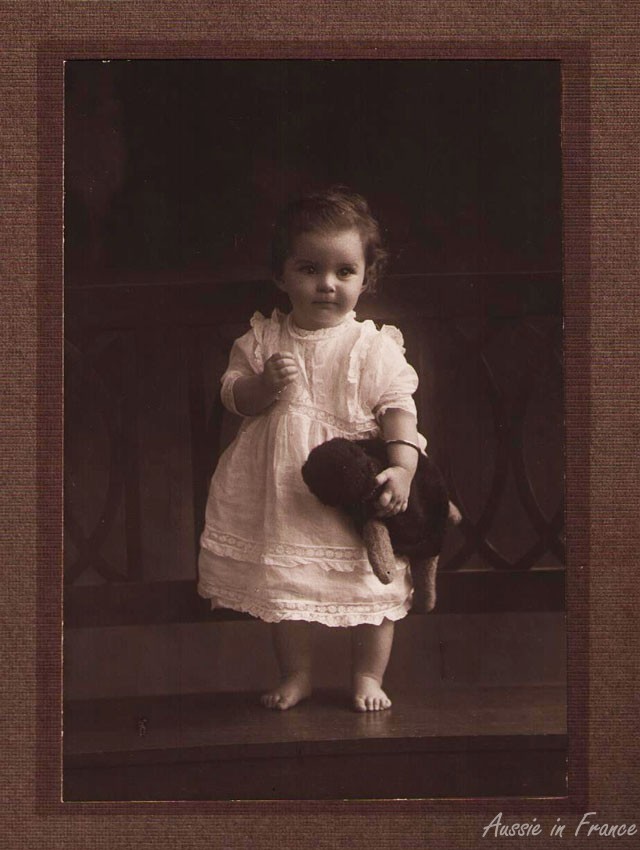
Her real mother, Ada, conceived her in the ship that took her family – her husband and four children aged 2 to 10 – to Australia. She died in childbirth in Brisbane in 1920. My mother, Ada Joan, who only weighed one kilo at birth was unofficially adopted by an older couple who didn’t have any children of their own. To keep her alive, her foster mother strapped her to her chest at night.
When my mother was eight months old, her father took the other children back to England, promising to send for her when she was old enough to travel. He never did and never made any contact with her at any time.
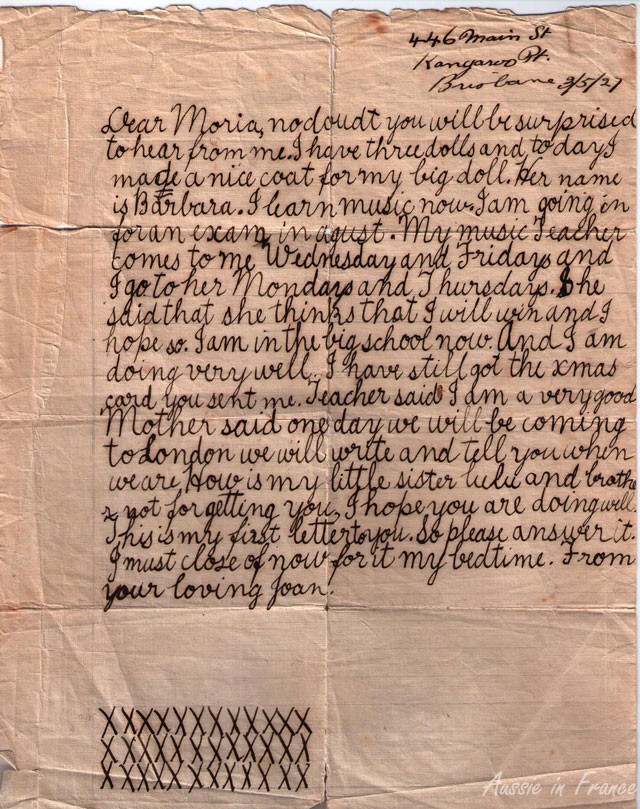
It’s now a few months after her 7th birthday and my mother has started corresponding with her older sister, Moira, and will do so until she’s fifteen. The letters are poignant.
But Moira wants to visit her in Australia so my mother cuts off all correspondence because, as she explains to me later, she is afraid her sister won’t like her.
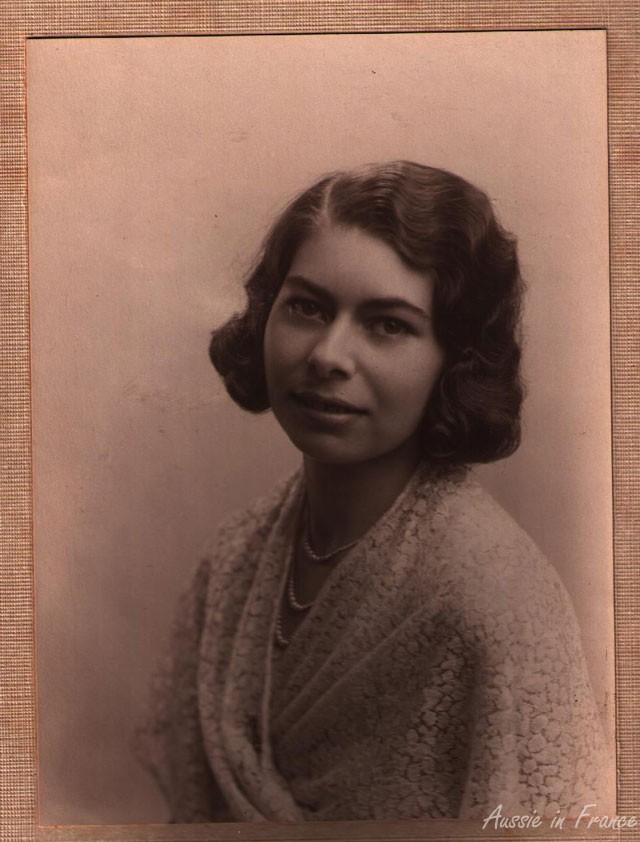
The year she turns 18, my mother’s foster parents, whom she loves very much, both die within six months of each other leaving her no family at all. By then she is living and working in the Crown Sollicitor’s office in Canberra. She gets engaged to a man called Jack, I think, but like so many other young men at the time, her fiancé is killed in World War II.
Back in Brisbane after the war, she meets my father, the oldest of a family of 9 children from a sheep property in northern New South Wales. They get married in Brisbane in 1948. After three years without any sign of pregnancy, they are about to adopt a baby when my sister is conceived.
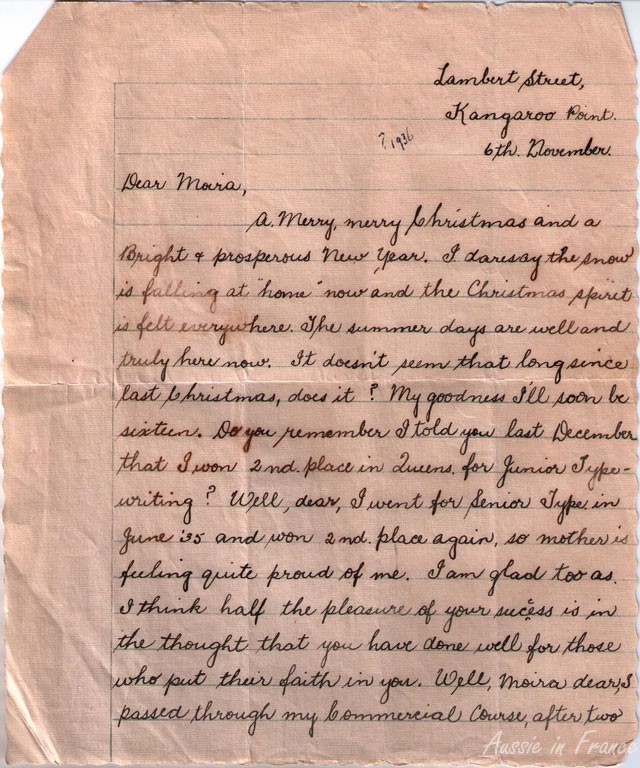
I am born the next year and my two brothers soon come along, each spaced three years apart. My mother has two miscarriages after that. She is devastated. She wants a big family. We are on holidays on the Atherton Tablelands when she miscarries the second time. I don’t understand what’s happening but suddenly my mother is in hospital.
In 1966, my sister is 14. We’re holidaying on a nearby coral island and are visiting friends. My brothers are playing out the back of the house and my sister goes to check on them. The next thing, one of the boys comes back to tell us that a rock has fallen on my sister. Death must have been instant. There is absolutely no explanation why a ten-ton rock should have moved as that precise moment.
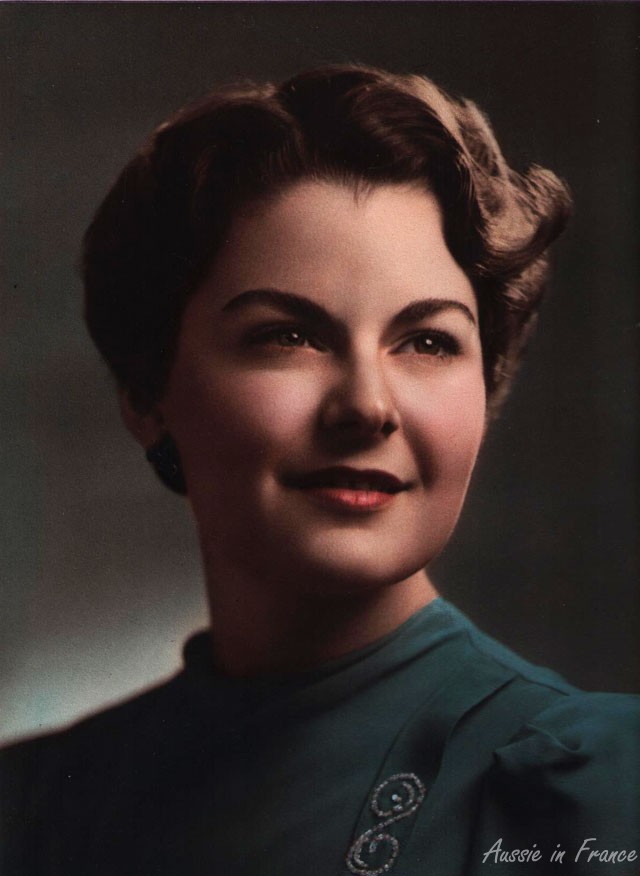
My mother has lost the first person of her own flesh and blood she has ever known. When I have my own son and daughter, I realise what it must have been like. I am utterly paranoid the year each of them turns 14. I am always aware of the great fragility of the life of a child.
Many years later, I am visiting my mother who is on holiday in London. She asks me to go with her to the births and deaths registry at Somerset House. We track down her parents’ birth and marriage certificates and are able to find some addresses in the north of England. None of them, however, produce any results.
It is not until my mother is 70 that a genealogy expert at the university in Townsville tracks down her older sister Moira who is then a retired registered nurse living in Canada. My parents go to meet her in Toronto and learn the rest of the story which proves even more devastating.
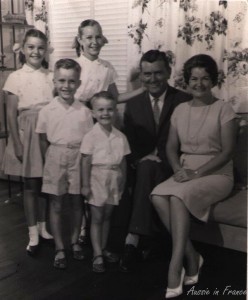
It turns out that my mother’s parents were travelling out to Australia to see her mother’s mother who, for some reason no one seems to know, was living in Brisbane at the time. My mother’s maternal grandmother LIVED IN THE SAME STREET as my mother until she died, without ever acknowledging her in any way. She is buried in the Kangaroo Point cemetary in Brisbane.
Moira has kept my mother’s letters all these years and that is how we have them today. She is able to give very little news of the rest of the family. One of her brothers also emigrated to Canada and was blown up in a laboratory accident. She herself has never married. The two sisters keep in regular contact after that, mainly at my mother’s instigation, but after my father dies in 1993, there are no more trips overseas so the two sisters don’t ever meet again.

After my mother’s death in the year 2000, I try to phone Moira but get no answer so I send a card. There is no response. A couple of years later my younger brother receives a letter from a sollicitor in Canada telling us that Moira has left her very small estate to a charity and asking if we want to contest the will, which we don’t of course.
In today’s world of the Internet and social media, my mother’s story would have ended differently, I believe. Australia back in 1920 was really at the end of the earth. Communication was slow and difficult. But it doesn’t explain her grandmother’s attitude, does it?

Rosemary, what a touching story…fascinating but also so sad… Thank you for sharing it.
I need to ask…did your mums grandmother actually KNOW she lived in same street? And if she did….well , maybe she just wanted to be able to see her from afar sometimes…..Could be anything…but on the surface quite baffling.
Beautiful photos. You gorgeous young thing you 🙂 xxxx
Thank you Jill. Yes, her grandmother knew she lived in the same street. During the 8 months before Mum’s father went back to England, he stayed with the grandmother. It was she who found the foster mother.
Thank you for sharing that story of your mother. Family history reveals some mysteries, some of which will never be solved. My father’s mother died when he was only eleven days old and he only had one contact with his maternal grandfather when he was a young adult. Much later, three years before he died in 1986, one of his cousins on his mother’s side made contact and that was very special for him. I wonder in their grief at losing their daughter, they didn’t want to have anything to do with the baby. But it is strange that your great grandmother lived in the same street all those years without making contact.
As children we take the adults in our lives for granted and only later do we sometimes learn what extraordinary stories they had before theywere part of our lives. I still remember being amazed at Mrs M’s funeral to learn so much about her life before she became our neighbour.
I still also remember the shock of learning of your sister’s death. I think it would have been the first time someone close to my age had died. Your mother was extraordinary in how she kept helping at the school. Perhaps it helped her in her grief.
It’s difficult to understand the grandmother’s action in today’s world. Maybe it made sense then. We don’t even know what she was doing in Australia in the first place. So many questions left unanswered.
I remember a girl in Christine’s class falling over when roller skating when she was in Grade 7. She died the next day. That was my first experience of a child dying.
Thank you for sharing such a poignant and personal story. Your mother must have been left with so many questions. The fractures and the losses are really sad.
Yes, and when she finally met Moira, she hoped to find answers and a closeness which she never found unfortunately.
A fragment of intimate revealing for our hearts, Rosemary, acutely pointing up the universally present, thin edge of life fragility. Does anyone escape the razor’s edge, the balancing act required to remain intact ? I suspect not.
Your mother awoke into a Dorothea Mackellar ‘wide & sunburnt country, a land of sweeping plains’. The strength & beauty of Mackellar’s telling poetry & diaries speak to the internal landscape of womens’ tightly held griefs within an overwhelming, male dominated society such as Australia determined & which continued. Perhaps your mother’s grandmother had her own secrets, too difficult to share out loud. An era of closed consciousness prevailed over any emotional well-being.
Incidentally you & Dorothea shared vocations as language interpreters while Gunnedah, her territory, is reachable for Glen Innes, Tenterfield or Armidale dynastic roots. As the crow flies of course! Thank you Rosemary.
A truly shocking, but very sad story. However it’s more than a story, it is the intimate detail of your life and that of your mother. It leaves one with more questions than answers.
I wonder,too, about whether your mother’s grandmother knew, and if she did, why she didn’t make herself known.
I’m hoping that within the tragedies that shaped your mother’s life, that she was able to love, and knew that she was loved in return.
Thank you for sharing your mother’s story.
The grandmother knew she was there because my mother’s father stayed with her for the eight months after my mother’s birth. My mother spent her whole life looking for roots and stability, Gaynor. She was courageous and cheerful and dynamic to the outside world but haunted by loneliness as soon as she was at home and by herself.
Thank you Emerald, for your kind words. I have always loved Dorothea Mackellar’s poetry. I think that my great grandmother must indeed have had her own secrets. Why was she living in Australia? That we don’t know.
What an amazing story. Your photos and letters really punctuated it well. Thanks for sharing this with us. I found it quite moving.
Thank you Stuart.
Wow! What a compelling story. Families are strange complex beasts with the most surprising secrets. Often it is impossible for the living to understand why these secrets were kept. Usually it’s shame of some sort, but often nothing that would be considered shameful in the modern world. People brought up with certain attitudes often hold them all their lives, long after they have gone out of fashion. Remind yourself that your mother was better off living with her adopted parents who loved her than with a grandmother who could cut herself off emotionally in that way. I wonder if it is no coincidence that her adopted parents lived in the same street. How did they come to hear of the baby being available?
Yes, I agree, it’s hard to understand the shame that people felt in the face of events that today are common.
The grandmother lived in the same street as Mum’s adopted mother who was not able to have any children of her own so had looked after several foster children by the time Mum was born. She was quite old by then. I guess the other people in the street knew she would help. In 1920, there was no official adoption in Australia. I regret now that I didn’t ask more questions after Mum contacted Moira but I was living in France and very much involved in my own children and marital problems at the time. Also, it was not something Mum liked to talk about. She hated her real father vehemently because of his rejection of her.